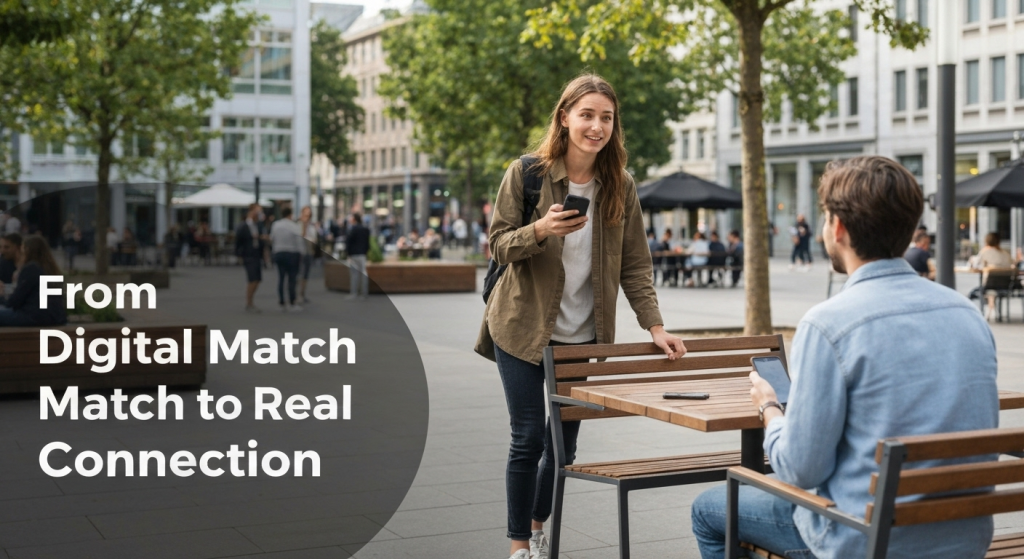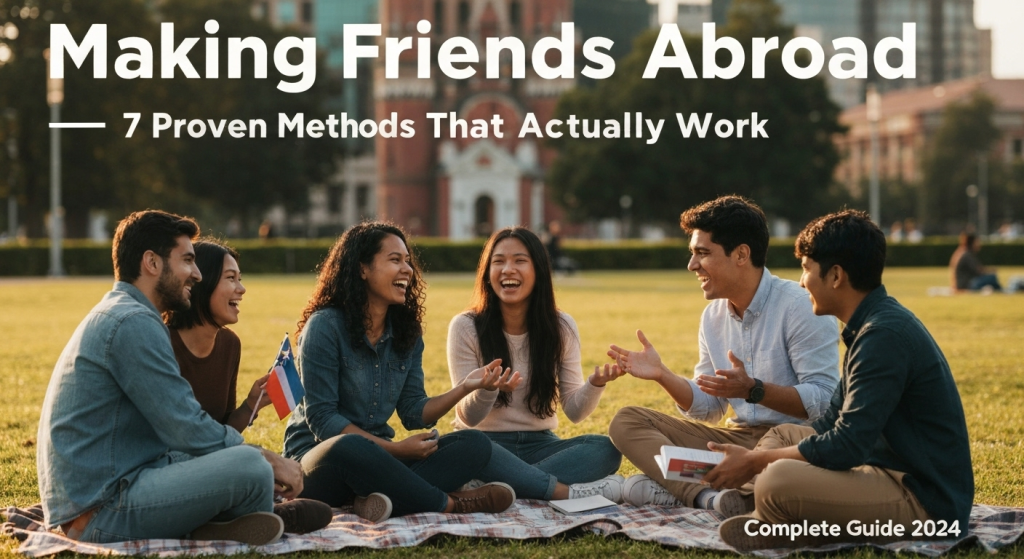fMoving to a new country can feel like stepping into a movie where everyone knows the plot except you. The excitement of fresh adventures quickly meets the reality of eating dinner alone again. After five years of helping people navigate international relocations and building my own network across three different countries, I’ve learned that making friends abroad isn’t just about being friendly—it’s about being strategic.
Hi, I’m Mahnoor Farooq, and I’ve spent the last five years as a cross-cultural consultant helping expatriates build meaningful connections in their new home countries. My journey started when I moved from Pakistan to study abroad, facing the same challenges many of you know too well. That lonely feeling of scrolling through your phone with no one local to call. The awkward small talk that never seems to develop into real friendship. The cultural misunderstandings that leave you questioning if you’ll ever truly belong.
Through trial, error, and countless conversations with fellow expats, I’ve developed a systematic approach to building genuine friendships abroad. This isn’t about collecting business cards or surface-level acquaintances. We’re talking about finding your people—those friends who become your chosen family in a foreign land.
Why Traditional Friendship Advice Fails Abroad
Most friendship advice assumes you’re operating within your own culture. “Just be yourself” sounds great until you realize “yourself” includes cultural references nobody understands and humor that doesn’t translate. The rules change when you’re the outsider looking in.
Standard networking events often attract other newcomers who are equally lost. Local social circles can feel impenetrable, built on years of shared history you can’t replicate overnight. Dating apps for friendship sound promising but often lead to awkward coffee meetings that fizzle out after one conversation.
The real challenge isn’t meeting people—it’s converting those initial meetings into lasting relationships. Cultural barriers, language differences, and simply not understanding local social norms create invisible walls between you and potential friends.
Here’s what actually works: understanding that friendship abroad requires different strategies than friendship at home. You need to be more intentional, more patient, and more willing to step outside your comfort zone. But the payoff is incredible—international friendships often become deeper and more meaningful than many relationships back home.
Method 1: Join Activity-Based Communities

Skip the generic networking events and dive into activities you genuinely enjoy. Shared experiences create natural bonding opportunities that small talk can’t match. When you’re learning pottery together or struggling through a hiking trail, conversations flow naturally around the common challenge.
Look for recurring activities rather than one-time events. Consistency builds familiarity, and familiarity breeds friendship. I joined a weekly cooking class during my first year in Germany, and three years later, those classmates became my closest friends. We bonded over burnt bread and badly seasoned soups, creating inside jokes and shared memories that formed the foundation of lasting friendship.
Best Activity-Based Options:
- Language exchange groups (you help with English, they help with local language)
- Sports clubs or recreational leagues
- Hobby groups (photography walks, book clubs, board game nights)
- Volunteer organizations
- Fitness classes or running groups
The key is choosing activities that require some level of interaction and collaboration. Solo activities like individual gym workouts won’t create the same connection opportunities as team sports or group projects.
Consider joining multiple groups initially. Not every group will click, and that’s normal. Give each activity at least three sessions before deciding if it’s worth continuing. First meetings are always awkward, but by the third session, you’ll see real personalities emerge.
Method 2: Master the Art of Follow-Up
Meeting people is easy. Converting those meetings into friendships is where most people fail. The difference lies in strategic follow-up that feels natural rather than forced.
I learned this lesson the hard way after collecting dozens of phone numbers that never led to actual friendships. The problem wasn’t the initial connection—it was my follow-up game. I was either too eager (texting the same day) or too passive (waiting for them to reach out first).
The 48-Hour Rule Wait 24-48 hours after meeting someone, then send a specific follow-up message. Reference something particular from your conversation to show you were actually listening. Instead of “Great meeting you,” try “Hope your presentation went well today! Would love to hear how it turned out over coffee sometime.”
Suggest Concrete Plans Vague invitations die in message threads. “We should hang out sometime” translates to “We probably won’t hang out ever.” Instead, suggest specific activities with defined timeframes: “Want to check out that farmer’s market you mentioned this Saturday morning?”
Make It Easy to Say Yes Lower the commitment bar for second meetings. Lunch feels less intense than dinner. Coffee takes less time than a full afternoon activity. As relationships develop, you can suggest longer, more involved activities.
The Three-Touch System After the initial follow-up, maintain connection through three meaningful touches over the next month. Share an article related to their interests, invite them to a group activity, or simply check in about something they mentioned. This keeps you on their radar without seeming desperate.
Method 3: Leverage Technology Strategically

Dating apps for friendship get mixed reviews, but when used correctly, they can jumpstart your social network. The key is treating them as introduction tools, not relationship builders. The real work happens offline.
Best Apps for International Friendship:
- Bumble BFF (friend mode on the dating app)
- Meetup (find local interest groups)
- Facebook Groups (city-specific expat communities)
- HelloTalk (language exchange with friendship potential)
- Internations (expat networking events)
Making Apps Work for You: Be specific in your profile about what you’re looking for. “Looking for hiking buddies and coffee shop recommendations” works better than “New in town, let’s be friends.” People respond to concrete activities they can visualize themselves enjoying with you.
Use apps to find group activities rather than one-on-one meetings initially. Group settings feel safer for everyone and create less pressure. If you connect with someone at a group meetup organized through an app, the friendship has a better foundation than random app matching.
Don’t rely entirely on apps. They’re tools to supplement, not replace, real-world connection strategies. The most successful friendship-seekers use apps to discover activities and communities, then focus their energy on showing up consistently to those in-person events.
Pro and Cons of Friendship Apps:
| Pros | Cons |
|---|---|
| Access to people actively seeking friends | Can feel artificial or forced |
| Filter by interests and location | High flake rate for meetups |
| Good for discovering local events | Requires significant time investment |
| Works well for introverts | May attract people with unrealistic expectations |
Method 4: Embrace Cultural Learning Opportunities

Nothing opens doors like genuine curiosity about local culture. People love sharing their traditions with someone who shows authentic interest, and cultural learning creates natural mentorship dynamics that often evolve into friendship.
Language classes offer more than vocabulary—they provide cultural context and connect you with other learners facing similar challenges. Cultural centers, museums, and historical societies often host events designed to educate newcomers about local customs and history.
Cultural Connection Strategies:
- Attend local festivals and cultural celebrations
- Take traditional cooking classes
- Join cultural orientation programs for newcomers
- Visit community centers in your neighborhood
- Participate in religious or spiritual communities if that aligns with your beliefs
Ask questions about things you observe but don’t understand. Most locals appreciate when newcomers show genuine interest in their culture rather than just expecting everything to accommodate their preferences. “Can you help me understand why people do X?” is a great conversation starter that positions the other person as an expert.
Learn local etiquette for social interactions. Simple things like how people greet each other, appropriate topics for casual conversation, or typical timing for social invitations vary dramatically between cultures. Understanding these unwritten rules helps you navigate social situations more smoothly.
Method 5: Build Professional Networks That Become Personal
Don’t underestimate workplace friendships, but don’t limit yourself to immediate colleagues either. Professional networking events, industry meetups, and career-focused groups can lead to genuine personal connections when approached with the right mindset.
The trick is being genuinely interested in people as individuals, not just their professional utility. Ask about their journey to your city, their experiences adjusting to local work culture, or their favorite local discoveries. Professional networking becomes personal when you shift focus from what people can do for your career to who they are as humans.
Professional-to-Personal Bridge Strategies:
- Suggest coffee meetings outside the office environment
- Invite colleagues to non-work social activities
- Join professional associations with social components
- Attend industry conferences with networking receptions
- Participate in workplace volunteer activities
Coworking spaces, particularly in major cities, often host social events designed to help members connect beyond work. These environments attract other professionals who understand the challenges of building social networks while establishing careers.
Be patient with professional relationships. The transition from colleague to friend takes time and requires opportunities to interact outside work contexts. Look for natural bridges like shared interests discovered through casual conversation or mutual frustrations with adjusting to local work culture.
Method 6: Become a Connector Yourself
One of the fastest ways to build a social network is to help others build theirs. When you introduce people who hit it off, you become the common connection in their friendship. This positions you as a valuable member of multiple social circles.
Start small by connecting people with similar interests or complementary needs. Introduce the new German colleague to the established expat who’s looking for language exchange partners. Connect two neighbors who both mentioned wanting workout buddies.
How to Become a Social Connector:
- Remember details about people’s interests and needs
- Actively look for connection opportunities between your acquaintances
- Host small gatherings that bring different friend groups together
- Share information about local events and activities
- Offer to include new people in established activities
Hosting doesn’t require elaborate dinner parties. Organize simple activities like park picnics, coffee shop meetups, or group walks. The goal is creating opportunities for people to interact in relaxed settings where friendships can develop naturally.
Being a connector also means being reliable and inclusive. When you invite people to activities, follow through on logistics and make sure everyone feels welcome. Your reputation as someone who brings people together will attract others who value community building.
Method 7: Practice Consistent Presence
Friendship requires showing up repeatedly over time. One-time meetings rarely convert to lasting relationships, but consistent presence in the same communities increases your chances of developing meaningful connections exponentially.
Choose two or three regular activities and commit to attending consistently for at least three months. This might mean weekly volleyball games, monthly book club meetings, or biweekly language exchange sessions. Consistency allows relationships to develop gradually through repeated positive interactions.
Building Consistent Presence:
- Pick activities that fit your actual schedule long-term
- Show up even when you don’t feel like socializing
- Become known for reliability in your chosen communities
- Take on small responsibilities that increase your investment
- Remember personal details about regular attendees
The compound effect of consistent presence is powerful. People start expecting to see you, saving spots for you, and including you in plans outside the regular activity. You transition from newcomer to established member of the community.
Track your social activities for the first month to identify patterns. Which activities energize you? Where do you have the most natural conversations? Which communities seem most welcoming? Use this data to focus your energy on the most promising opportunities.
Overcoming Common Obstacles
Language Barriers Don’t let imperfect language skills stop you from socializing. Many locals appreciate your effort to communicate in their language, even if it’s imperfect. Use translation apps as backup, but don’t hide behind them. The struggle to communicate often creates memorable bonding moments.
Cultural Misunderstandings Expect to make cultural mistakes and learn from them gracefully. Ask for clarification when you’re unsure about social norms. Most people understand that foreigners need time to learn local customs and will appreciate your effort to adapt.
Homesickness and Comparison Resist the urge to constantly compare your new location to home. Focus on discovering unique aspects of your new environment rather than lamenting what’s different. Homesickness is natural, but dwelling on it can prevent you from fully engaging with local opportunities.
Time Constraints Building friendships takes time, but you don’t need hours every day. Thirty minutes of intentional social effort several times per week can yield significant results over months. Quality matters more than quantity in both time invested and connections made.
Measuring Your Progress
Track your social progress to stay motivated during challenging periods. Keep a simple log of social activities, new people met, and follow-up conversations. This helps you identify successful strategies and adjust approaches that aren’t working.
Social Progress Indicators:
- Number of recurring social activities you participate in
- Frequency of one-on-one interactions with new people
- Invitations you receive to social events
- People who reach out to you for advice or casual conversation
- Comfort level navigating local social situations
Monthly Friendship Assessment:
| Category | Month 1 | Month 3 | Month 6 |
|---|---|---|---|
| Regular Social Activities | 0-1 | 2-3 | 3-4 |
| People I Could Text for Coffee | 0 | 2-3 | 5-7 |
| Local Cultural Knowledge | Basic | Intermediate | Advanced |
| Comfort in Social Settings | Low | Medium | High |
Set realistic expectations for timeline. Surface-level acquaintances can develop within weeks, but genuine friendships typically take 6-12 months to solidify. Don’t get discouraged if progress feels slow initially.
Frequently Asked Questions
How long does it typically take to build a solid friend group abroad? Expect 6-12 months to develop your first genuine friendships and 18-24 months to build a solid social circle. This timeline varies based on language barriers, cultural similarities, and your consistency in social activities.
Is it better to befriend locals or other expats? Both offer unique advantages. Expats understand your adjustment challenges, while locals provide cultural insight and long-term stability. Aim for a mix rather than exclusively pursuing one group.
What if I’m naturally introverted? Do these strategies still work? Absolutely. Focus on smaller group activities and one-on-one interactions rather than large social events. Quality over quantity works especially well for introverted friendship-builders. Choose activities based on your interests rather than forcing yourself into uncomfortable social situations.
How do I know if someone wants to be friends or just being polite? Look for reciprocation in communication and initiative. If someone consistently responds positively to your invitations and occasionally suggests activities themselves, they’re likely interested in developing the friendship. Politeness usually doesn’t extend to multiple follow-up interactions.
Building Your International Community
Making friends abroad requires patience, strategy, and genuine curiosity about your new environment. The methods outlined here work because they create multiple touchpoints for relationship building while respecting cultural differences and individual preferences.
Success comes from consistent effort rather than perfect execution. You’ll make mistakes, experience awkward moments, and face rejection. These challenges are part of the process, not signs that you’re failing. Every expat who has successfully built meaningful friendships abroad has navigated the same difficulties.
Your international friend group will likely look different from your home country relationships. Embrace this difference as an opportunity to expand your perspective and develop new aspects of your personality. Many people discover sides of themselves they never knew existed when navigating friendship in a foreign culture.
The friendships you build abroad often become some of your most treasured relationships. The shared experience of being outsiders, the mutual support through cultural adjustment challenges, and the intentional effort required to maintain these connections create bonds that are both deep and resilient.
Start with one method that resonates with your personality and circumstances. Consistency in applying one approach will yield better results than sporadically attempting all seven methods. As you build confidence and see initial success, gradually incorporate additional strategies to expand your social network.
Remember, you’re not just making friends—you’re building a support system that will enhance every aspect of your international experience. These relationships will help you navigate challenges, celebrate successes, and truly feel at home in your adopted country.



